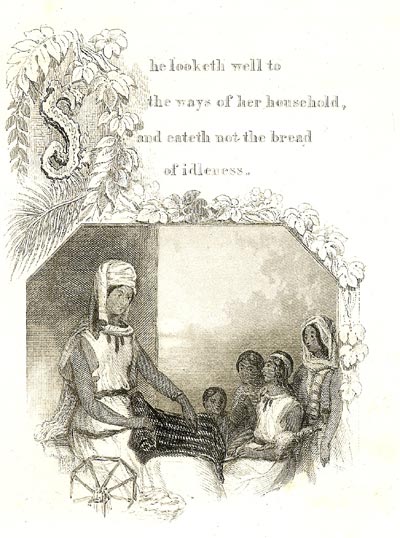*From The Excellent Woman of Proverbs 31 written in 1847 by Anne Pratt (1806-1893)

SHE LOOKETH WELL TO THE WAYS OF HER HOUSEHOLD,
AND EATETH NOT THE BREAD OF IDLENESS.
AND EATETH NOT THE BREAD OF IDLENESS.
Proverbs 31:27

When we consider the great influence which family training has on the world at large, we cannot wonder that He who divided mankind into families, should so commend the woman who looked well to the ways of those who compose the circle which she superintends. The constant recognition of family duties, the emphatic injunctions that women should be keepers at home, and love their husbands and love their children, all lead us to the remembrance that God is not only the God of each individual, but that he is indeed the God of all families.
The gentle words of a mother's love, the counsels of a father's wisdom, how do they return with freshness and vividness upon the spirit, long after the lips which uttered them have mingled with the dust; and are awakened with all their power, by some little incident, some casual word-the sight of a handwriting-the scent of a flower.
During that awful season of tragic suffering comprised in the French revolution, many valuable lives were saved by the attachment of confidential servants; and that period, remarkable for the exhibition of some of the deepest crimes, and some of the sweetest virtues of human nature, presents a record of devoted men and maidens, who counted not even their own lives dear unto them, so that they might rescue from danger some mistress whose former kindness had cheered them, or some helpless child whom they once had carried in their arms. The history of the church of God, too, could present details of holy and useful servants, from the time when Phoebe was a servant at Cenchrea, and Onesimus was dear to the apostle Paul, to the recent days when the Dairyman's Daughter performed her humble duties with exalted faith and fervent piety, till her spirit sought its heavenly home, and her frame was laid in its lowly grave.
A woman so well taught in wisdom's ways as the matron of the text, would know well that idleness leads certainly to vice and sorrow. Idleness and fulness of bread were the vices mentioned as exciting God's wrath against the sinful Sodom, and were doubtless the chief means of fostering all its depravity.